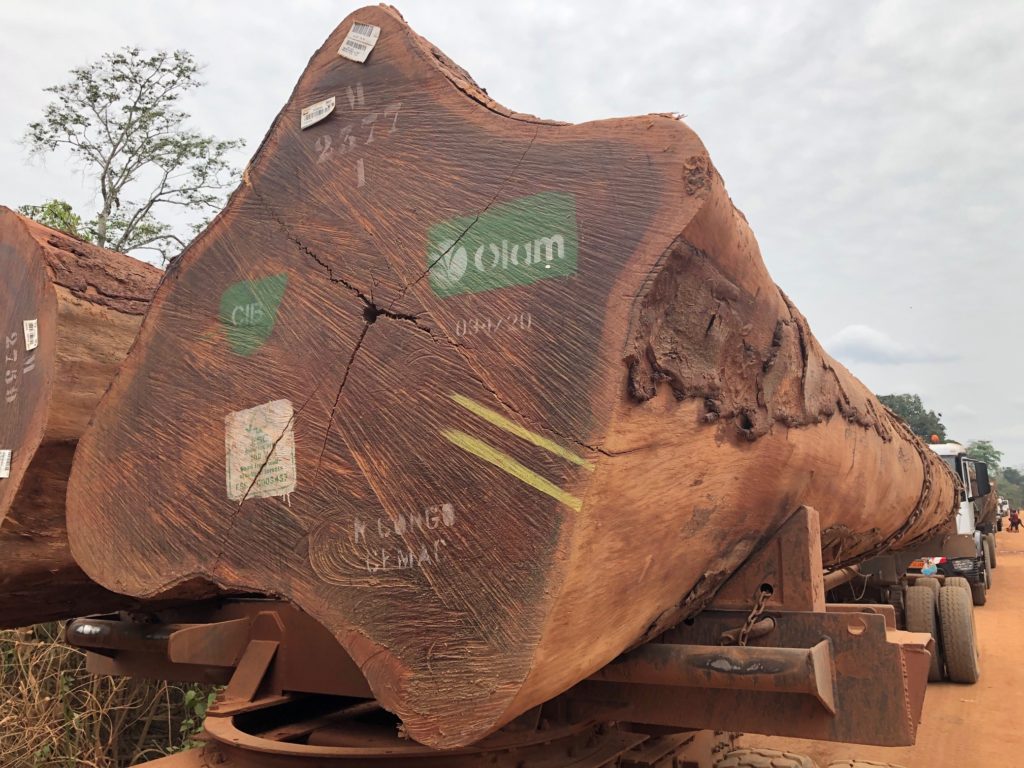A recent report by the Environment Investigations Agency (EIA)[1] detailed the extent to which corruption, transnational criminal activity and poor forest governance are negatively impacting forests of the Congo Basin. Republic of the Congo and Gabon were singled out for concern.
Republic of the Congo
While most of Central Africa is prone to unlawful timber practices, Republic of the Congo (RoC) stands out given the high percentage of forests under committed logging concessions combined with weak institutional capacity to address illegal timber harvesting.
Sixty-five percent of RoC’s forests are under concession management, the highest percentage of any country in Central Africa, representing 26% of Congo Basin forests. Despite that high rate – or perhaps in part because of it – RoC’s ability to safeguard its forest resources and combat illegal timber trade are limited. The pervasive nature of the illegal timber trade exploits these limitations, resulting in crime at every level in the harvest and export supply chains.
To address its illegal logging problem, the Congolese government recently joined with the U.S. Department of State’s Bureau of International Narcotics and Law Enforcement (INL) and the U.S. Forest Service (USFS) to undertake a two-year law enforcement capacity building program. Significant progress has been made during the past year, despite challenges brought on by the Covid pandemic:
- An inter-ministerial Forestry Law Enforcement Task Force was established by government decree. The task force comprises high-level representation of the country’s major ministries – including forestry, justice, interior, planning – together with civil society organizations, providing a critical structure to share best practice and monitoring and enforcement data and operations.
- Field monitoring and audits are underway in two principal hotspot transborder corridors of illegal logging shipments into neighbouring Cameroon. Task force agencies and compliant forest concessions are working with local civil society groups and communities to share best practice on monitoring and to enhance law enforcement cooperation.
- The World Resources Institute (WRI) is providing training of government and civil society actors on utilization of its “GLAD” surveillance system and related Open Timber Portal to monitor and track illegal logging trade in the hotspot transboundary corridors.

The project aims to increase the capacity of law enforcement agencies and civil society groups to more effectively monitor and share information on illegal timber operations and to reduce transboundary criminal timber trade with enhanced interdiction and law enforcement.
Gabon
Nowhere in Africa has the illegal timber trade been more blatantly exhibited recently than in Gabon, where an illicit shipment of over 350 shipping containers of illegally sourced rosewood was confiscated last year and much of it subsequently lost to transnational criminal operators.
Still, several recent developments in Gabon offer a significant window of opportunity to address the illegal timber trade originating in the country and involving transnational organized criminal networks. First, the country’s Penal Code was recently amended to include criminal penalties for illicit timber harvesting and trade. These new provisions provide meaningful legal remedies to discourage illegal timber trade and related corrupt practices and to prosecute criminal operators. In addition, the government recently adopted a new environmental law unit in the national Libreville court that will empower judges and the broader criminal justice system to successfully prosecute illegal timber activities and related natural resource crimes and corruption.
Finally, and perhaps most important, the political will to counter the illegal timber trade in Gabon is now in place at the highest levels of government. As a direct result of the rosewood or Kevazingo case last year, Gabon President Ali Bongo appointed Lee White, a longtime conservation crusader, to head the Ministry of Forests, Environment and the Sea (Ministry of Forests).
Minister White identified two priorities to curb transboundary illegal timber trade in Gabon. The first is to strengthen the country’s law enforcement personnel – both ministry forest agents in the field as well judges and prosecutors – on methods to interdict and prosecute organized criminal actors trafficking in timber. The second is to deploy mass spectrometry equipment needed to quickly and effectively identify protected tree species and verify legally sourced timber exports. These two related efforts are considered potential game changers in addressing illegal timber trade in Gabon and helping curtail transboundary organized crime in the region.
The U.S. Forest Service (USFS) recently joined with the Ministry of Forests and Ministry of Justice to help implement the two identified priorities through a two-year illegal logging law enforcement project funded by the U.S. Department of State’s Bureau of International Narcotics and Law Enforcement (INL). Key support for the project is being provided by the U.S. Department of Justice, the U.S. Fish and Wildlife Service, and the U.S. Embassy/Libreville.
For more information please contact Richard Paton, U.S. Forest Service Central Africa Program, at richard.a.paton@usda.gov.
[1] Environmental Investigations Agency, “Toxic Trade.” 2019 https://eia-global.org/reports/20190325-toxic-trade